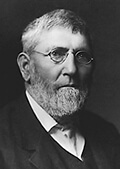Transfiguration Sunday / the Last Sunday after Epiphany
Click here to join the effort!
Bible Commentaries
Lipscomb's Commentary on Selected New Testament Books Lipscomb's Commentary on Selected NT Books
New Testament
Encouragement to a young church, with teachings on holiness and Christ's return. 2 Thessalonians
Clarifications about Christ's return and exhortations to stand firm in faith. 1 Timothy
Guidance for church leadership, sound teaching, moral conduct, and defending the truth of the gospel. 2 Timothy
Paul's final exhortations to Timothy, emphasizing perseverance and faithfulness. Titus
Instructions for establishing order in the church, promoting sound doctrine, and living with integrity. Philemon
A personal appeal for the forgiveness and restoration of a runaway slave, Onesimus.
Author's Biography
David Lipscomb (1831-1917) was a prominent figure in the history of the Churches of Christ in the United States, an influential religious leader, educator, and editor. Born in Franklin County, Tennessee, Lipscomb's early life was marked by the turbulent times leading up to and following the American Civil War. Despite the upheaval, he found a steadfast path in his Christian faith, which deeply influenced his views on society, politics, and education.
Lipscomb's journey into religious leadership began earnestly when he became a dedicated follower of the Restoration Movement, a Christian reform effort seeking to restore the church's practices to those described in the New Testament. His commitment to the principles of this movement shaped his theological and philosophical outlook, emphasizing simplicity in worship, the authority of the Scriptures, and the importance of personal piety and community service.
In 1866, Lipscomb co-founded the Nashville Bible School, which later became Lipscomb University, in Nashville, Tennessee. His vision was to create an institution that not only provided a solid academic education but also instilled strong Christian values in its students. Lipscomb believed in the power of education to reform society and advocated for a curriculum that balanced spiritual and intellectual development.
As an editor of the "Gospel Advocate," a widely read religious publication among Churches of Christ, Lipscomb used his platform to discuss religious doctrine, social issues, and the importance of non-participation in secular governance, reflecting his pacifist beliefs. He was a vocal critic of Christian involvement in military service and politics, arguing that such engagements were contrary to the teachings of Jesus Christ.
David Lipscomb's legacy is enduring, particularly in the areas of Christian education and the Churches of Christ. His life's work reflects a deep commitment to the ideals of the Restoration Movement and a profound belief in the transformative power of faith and education. Through his writings, educational endeavors, and spiritual leadership, Lipscomb left an indelible mark on American Christianity, emphasizing peace, piety, and the pursuit of scriptural purity.
